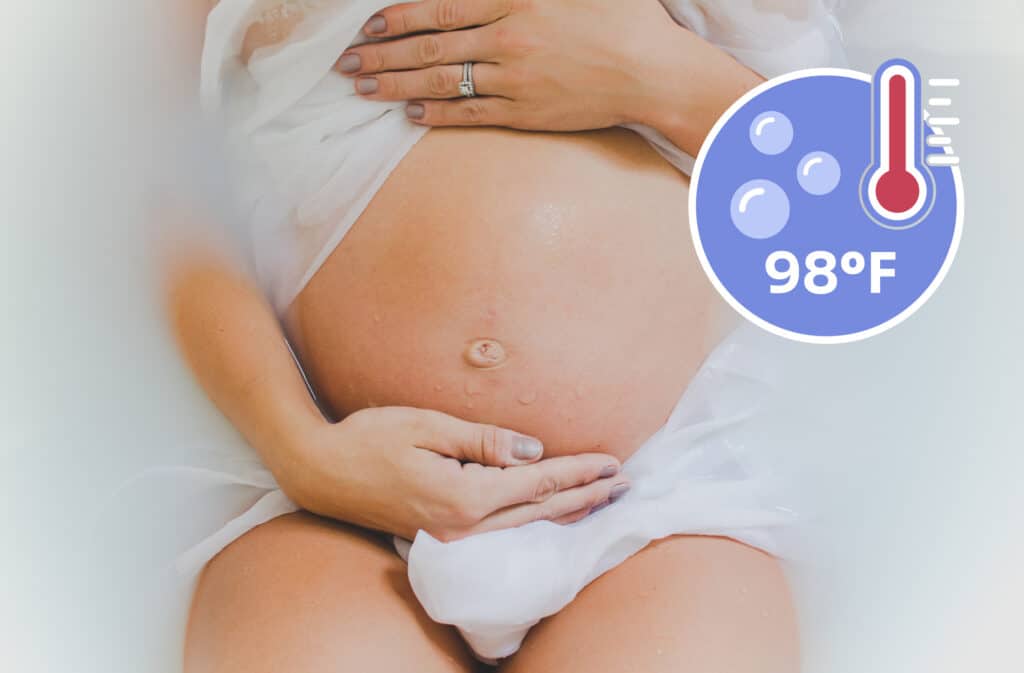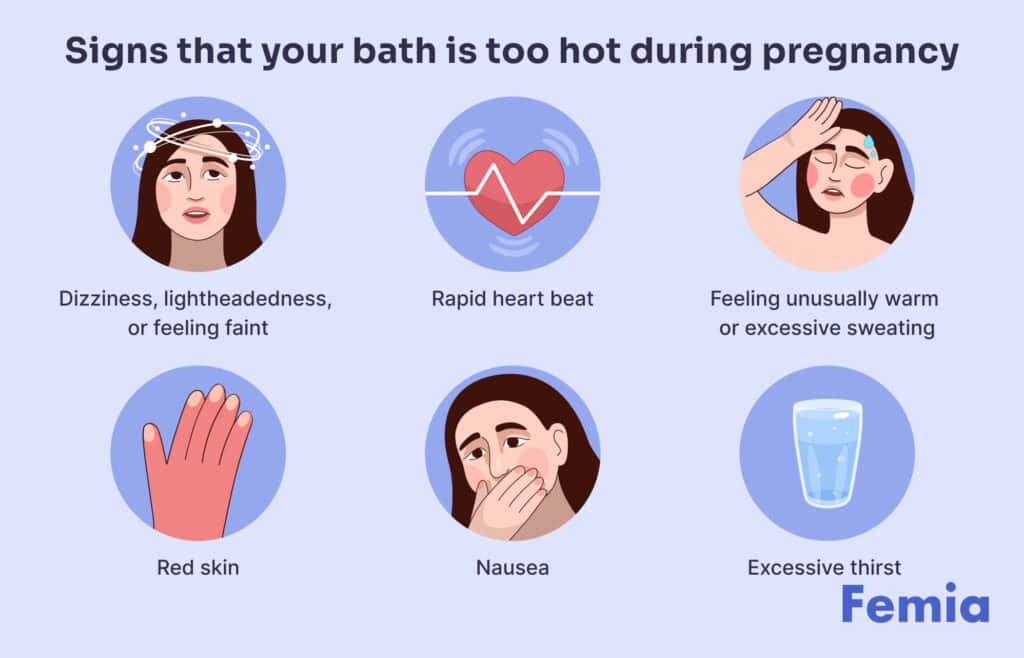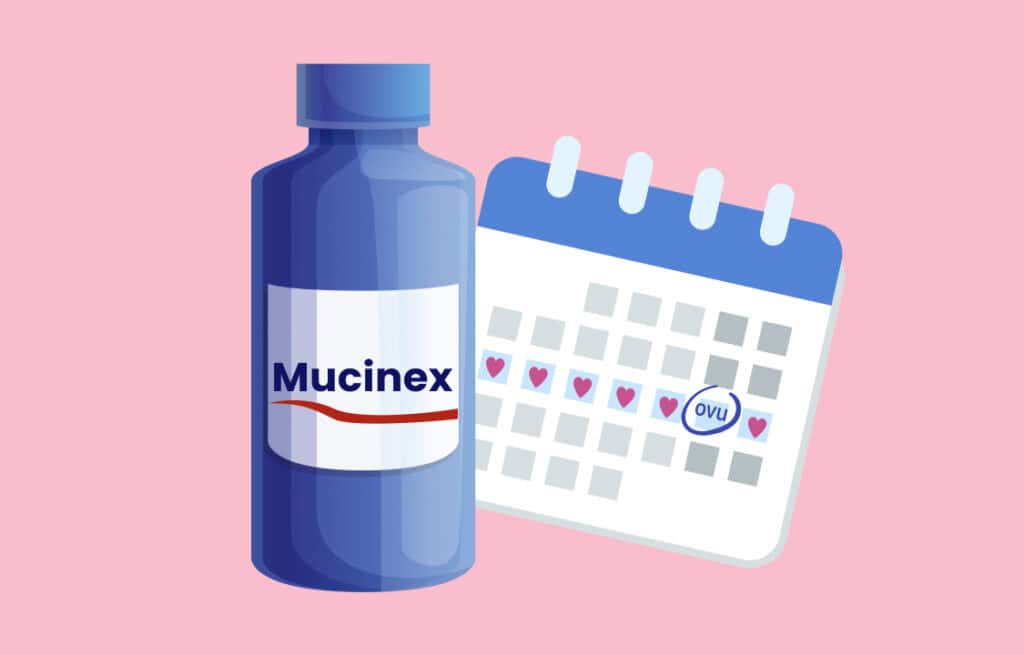Femia > Health Library > Pregnancy > Pregnancy health > Are baths safe while pregnant? Tips for a relaxing, risk-free soak
Are baths safe while pregnant? Tips for a relaxing, risk-free soak

- Updated Feb 10, 2025
- Published
CRAFTED BY HUMAN
Crafted by human At Femia, we provide accurate and up-to-date information at every stage of your journey, from trying to conceive, pregnancy and postnatal support. All content is created by a real person based on in-depth research and own professional experience. Femia ensures that you will receive expert advice, strict accuracy and a personalized approach from our authors/medical experts. Learn more about our editorial policy.
FACT CHECKED
Fact checked At Femia Health, we maintain the highest standards of editorial excellence in delivering content focused on helping you conceive, guiding you through pregnancy, and supporting you postpartum. Explore our content review principles to learn how we ensure the accuracy and quality of our health and lifestyle tips for every stage of your journey.
Taking a warm bath while pregnant is safe as long as you keep the temperature of your bath below 100ºF (37.8c). Make sure to monitor your body for signs of overheating—you should feel warm but not hot. Be extra cautious during the first trimester, as raised body temperature may be associated with miscarriage and neural tube defects.
Taking a bath is a great way to relax, soothe sore muscles, and take some much-needed “me time.” During pregnancy, finding relief for an aching back, swollen feet, or simply a moment to unwind can feel like the holy grail. But, you might be wondering, is it safe to take a bath while pregnant?
The short answer is yes—but with a few safety precautions. So, if you want to understand why you need to be cautious about hot water during pregnancy and how you can continue to enjoy a relaxing, risk-free soak, have a read below.
With Femia, you will get personalized insights every step of the way
Are baths safe during pregnancy?
As long as you follow a few simple guidelines, then taking a warm—but not hot—bath while pregnant can be both safe and relaxing. It’s a fantastic way to relieve common pregnancy discomforts like sore muscles, cramps, and back ache. It can also help reduce stress levels and promote better sleep—something that’s often hard to come by, even before the baby arrives.
Why are hot baths bad for pregnancy?
The normal body temperature of a pregnant woman is around 37ºC. Having a hot bath or sitting in a hot tub or sauna can raise your body temperature. During pregnancy, especially in early gestation, a rise in body temperature by more than 1–2ºC can be dangerous. The CDC recommends that pregnant women never let their core body temperature rise above 102.2ºF (39ºC).
Here’s why hot baths are bad for pregnancy:
- Danger to the fetus. A study published in JAMA in the 90s found that excessive heat exposure from hot tubs and saunas during early pregnancy was associated with an increased risk of neural tube defects (birth defects of the brain and spine). A second study of over 1,000 women, published by the American Journal of Epidemiology, found that using both hot tubs and whirlpool baths during early pregnancy was associated with a greater risk of miscarriage.
- Dehydration. During pregnancy, you’re more at risk of dehydration, and overheating in a hot bath can exacerbate this. Pregnant women should aim to drink at least 64 ounces of water a day.
- Overheating. During pregnancy, you’re more at risk of suffering heat stress. Sitting in a hot bath can lead to overheating and heat exhaustion. Symptoms of heat exhaustion include headache, dizziness, confusion, and muscle cramps.
👉Find out more: Which food can cause miscarriage: A comprehensive guide
Safe bath temperature for pregnant women
The safe bath temperature for pregnant women is around 98–100ºF (37–37.8ºC). Sitting in water hotter than this can lead to a raised body temperature, heat stress, and dehydration.
The American College of Obstetricians and Gynecologists (ACOG) recommends avoiding hot tubs and saunas during pregnancy. This is because, unlike baths, they’re usually much hotter and don’t naturally cool down. They can increase your body temperature to over 102ºF within 10–20 minutes, which may pose a risk to both you and your unborn baby.
Can you take a bath while pregnant in the first trimester?
Yes, you absolutely can take a bath while pregnant in the first trimester. It can be a great way to relax and ease any early pregnancy discomforts. However it’s important to be extra cautious with water temperature during this stage.
In the first trimester, your baby is undergoing rapid brain and nervous system development. Overheating during this stage has been linked to the development of congenital abnormalities, including an increased risk of neural tube defects as well as an increased risk of miscarriage. To keep things safe, make sure the water is warm but not hot—around 98–100ºF (37–37.8ºC).
How to take a comfortable bath while pregnant
After a long day on your feet, there are few things more enticing than a relaxing soak in your tub.
Here are some tips to help you have a safe and enjoyable bath during pregnancy:
- Use a thermometer. It can be difficult to judge the temperature of bathwater, especially if you’re used to hot baths. Buy yourself a bath thermometer to monitor the water temperature safely; you will likely need one anyway once the baby arrives.
- Stay vigilant. If you notice any signs of overheating (headache, dizziness, thirst), take steps to lower your body temperature. Use a cool cloth on your head and chest, add cold water to your bath, drink plenty of water, and ask someone to help you out of the bath if you are worried you might slip.
- Be careful getting in and out. Use a non-slip bath mat to help you get in and out of the bath or ask someone for help, especially in the later months. Your growing belly can throw off your center of gravity, making you more likely to lose your balance.
- Drink water. Have a bottle of cold water next to your bath so you can stay hydrated during your soak.
- Avoid scented products. During pregnancy, you’re more at risk of developing a yeast infection in your vagina called ”thrush.” Avoid adding scented oils or soaps to your bath, as they can alter your vagina’s natural flora, causing thrush. Instead, try lighting a scented candle in the room to give your bath time that spa-like feeling, or switch to pregnancy-safe bath salts.
Ice bath while pregnant: Is it safe?
There is limited evidence on the safety of ice baths during pregnancy, so it’s best to avoid them. Extreme cold exposure, like ice baths, can trigger what’s known as the ”cold shock response”—this can affect your circulation and blood pressure, leading to dizziness or even fainting. Additionally, exposure to very cold temperatures can cause your blood vessels to constrict, which potentially could limit blood flow to your baby.
Alternatives to hot baths: Safe ways to relax
If you’re looking for safe and relaxing alternatives to hot baths during pregnancy, there are several options you can try:
- Warm (not hot) showers. A warm shower can be just as soothing as a bath. Let the water gently run over your shoulders and back to help relax your muscles without worrying about overheating.
- Foot baths. Soaking your feet in a warm basin of water can be very relaxing, especially if you’ve been on your feet all day. Consider adding a pregnancy-safe essential oil for extra relief.
- Heating pads. You can use a heating pad safely on a low setting—just make sure it’s not too hot, and limit the time you use it to avoid overheating. It is safe to apply it to your lower back, shoulders, or hips for short periods to ease tension, but avoid placing it directly over your belly.
- Prenatal massage. If you have the option, a gentle prenatal massage can be a wonderful way to relax and relieve stress. Be sure to go to a certified therapist who specializes in prenatal care.
- Gentle stretching or yoga. Light exercise, like prenatal yoga or simple stretching, can help with relaxation, improve flexibility, reduce leg cramps, and relieve tension in your muscles.
👉Find out more: Safe and comfortable sex positions during pregnancy: A guide for couples
Signs that your bath is too hot during pregnancy

If your bath is too hot, then you might start to overheat. Here are some alarming signs to watch out for:
- Dizziness, lightheadedness, or feeling faint
- Red skin
- Excessive thirst
- Nausea
- Rapid heartbeat
- Feeling unusually warm or excessive sweating
If you accidentally take a hot bath during pregnancy, don’t panic. Short, infrequent exposure to hot water isn’t likely to be harmful. A 2018 systematic review of the effects of heat on the fetus (unborn baby) found that sitting in a hot bath of 40ºC for 20 minutes didn’t raise a pregnant woman’s temperature above 39ºC. So, while hot baths aren’t recommended during pregnancy, brief exposure to hot water is unlikely to cause harm. However, if you have any concerns about your health or the health of your unborn baby, then reach out to your healthcare provider. They will be able to offer you personalized, non-judgemental guidance that hopefully puts your mind at rest.
With Femia, you will get personalized insights every step of the way
Questions from Femia community
What is the best way to monitor bath temperature while pregnant?
To ensure your bath is safe during pregnancy, monitor the water temperature using a bath thermometer. As long as the water stays below 100°F (37.8°C), then it should be fine. Additionally, if you don’t have a thermometer, a good rule of thumb is to make sure the water feels comfortably warm to the touch, not hot or steamy. If your skin turns red, you start sweating, or you feel too warm, it's a sign that the water temperature might be too high.
Can I take bubble baths while pregnant?
Yes, bubble baths are generally safe to take during pregnancy, but make sure the products you use are free from harsh chemicals or fragrances. During pregnancy, your skin may be more sensitive and easily irritated, and you have a higher chance of developing thrush. Staying away from fragranced soaps can protect your vaginal flora (good bacteria) and skin.
How long can I stay in a bath while pregnant?
It's best to limit bath time to 15–20 minutes to avoid overheating or dehydration, even in temperatures lower than 100ºF. Make sure you monitor how you're feeling, and get out if you start to feel too warm.
The bottom line
Taking a bath during pregnancy can be a wonderful way to relieve aching muscles, take pressure off your joints, and reduce stress levels. As long as the water temperature stays under 100ºF and you don’t overheat, then it can be a safe and enjoyable way to relax.
Having hot baths during pregnancy or going in hot tubs and saunas can increase your body temperature and potentially harm both you and your unborn baby. High body temperatures, especially during early pregnancy, have been linked to a higher risk of miscarriage as well as an increased risk of neural tube defects.
To stay safe in the tub, make sure you have an accurate bath thermometer, and monitor your body for signs of overheating.
References
- “About Heat Exposure and Reproductive Health.” Reproductive Health and the Workplace, 14 Feb. 2024, www.cdc.gov/niosh/reproductive-health/prevention/heat.html?CDC_AAref_Val=https://www.cdc.gov/niosh/topics/repro/heat.html.
- “Can I Use a Sauna or Hot Tub Early in Pregnancy?” ACOG, www.acog.org/womens-health/experts-and-stories/ask-acog/can-i-use-a-sauna-or-hot-tub-early-in-pregnancy.
- “Hot Tubs During Pregnancy.” American Pregnancy Association, 7 Dec. 2023, americanpregnancy.org/healthy-pregnancy/is-it-safe/hot-tubs-during-pregnancy.
- Espeland, Didrik, et al. “Health Effects of Voluntary Exposure to Cold Water – a Continuing Subject of Debate.” International Journal of Circumpolar Health, vol. 81, no. 1, Sept. 2022, https://doi.org/10.1080/22423982.2022.2111789.
- Li, De-Kun, et al. “Hot Tub Use During Pregnancy and the Risk of Miscarriage.” American Journal of Epidemiology, vol. 158, no. 10, Nov. 2003, pp. 931–37, https://doi.org/10.1093/aje/kwg243.
- Milunsky, A., et al. “Maternal Heat Exposure and Neural Tube Defects.” JAMA, vol. 268, no. 7, Aug. 1992, p. 882, https://doi.org/10.1001/jama.1992.03490070064043.
- “Neural Tube Defects.” Birth Defects, 16 May 2024, www.cdc.gov/birth-defects/about/neural-tube-defects.html.
- Ravanelli, Nicholas, et al. “Heat Stress and Fetal Risk. Environmental Limits for Exercise and Passive Heat Stress During Pregnancy: A Systematic Review With Best Evidence Synthesis.” British Journal of Sports Medicine, vol. 53, no. 13, Mar. 2018, pp. 799–805, https://doi.org/10.1136/bjsports-2017-097914.

Considering using Mucinex to help you get pregnant? Find out whether the Mucinex pregnancy trick is fact or fiction, how to use it, and who should stay away.

Explore the Candida cleanse diet, including foods to eat and avoid, a 7-day meal plan, and tips to support gut health. Discover how to detox Candida naturally.

Discover safe and comfortable sex positions during pregnancy that enhance intimacy while accommodating bodily changes. Explore positions that prioritize comfort and intimacy, ensuring both partners feel connected and at ease.

